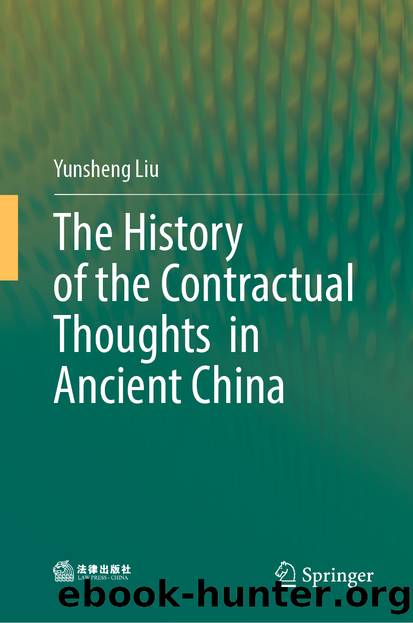The History of the Contractual Thoughts in Ancient China by Yunsheng Liu

Author:Yunsheng Liu
Language: eng
Format: epub
ISBN: 9789811557682
Publisher: Springer Singapore
The interesting part of this case was that the imploration with human sentiment “beat” argument based on reason. Fan acknowledged Lady Wangzhao Shi’s breach of the agreement “forgivable” though it was against the reasons due to the fact that she had to sell the house out of poverty. Therefore, her violation of the contract was understandable and valid. This was what D. F. Henderson called “didactic conciliation” rather than court verdict. The famous official assistant Wang Huizu in Qing Dynasty believed that a thorough understanding of law was absolutely necessary to be a successful official assistant; however, its application must be consistent with “human sentiment” with the complement of law to achieve the “co-existence” of both. His famous work Zuo Zhi Yao Yan put special emphasis on “human sentiment” by saying that “Understanding law is the essence of being a successful official assistant, and the elegance of its application lies in the observation of human sentiment. Customs vary from place to place. Therefore, it is of prior importance to learn modestly and make adjustments based on different situations before laws and decrees are adopted, thus coordination and reputation would be achieved. Otherwise resentment and slander would be generated.” His Xue Zhi Yi Shuo also read: “Human sentiment and local customs differ from one place to another. When an official first takes office, it is vital not to be self-righteous … Every time he hears a case, he needs to summon some knowledgeable and sophisticated people to learn about the local customs. Afterwards a fair judgment shall be achieved with the consideration of both law and sentiment.”54 If the “human sentiment” in Fan’s judgment laid emphasis on the improvement of the litigant’s life and the rationality of her subjective motivation, then Wang expanded the scope of “human sentiment” to law making, judicature and law enforcement, drawing a gigantic and shining arc for traditional “human sentiment”, thus exerting a huge influence on the traditional contractual development.
Third, “improving customs by rites”–regularization. The performance of ancient contracts, especially private commercial contracts, mainly relied on the power of the customary law, that was, “the customs and habits” that Wang Huizu repeatedly stressed. The power of the customary law was embodied in three kinds of powers, namely, those of clans, guilds and villages, which were the ultimate judicator and performer of contract validity. Sprenkel (Sybile Van Der Sprenkel) divided the Chinese legal institution into three levels: the first was the “informal mediation” that involved the mediation by a third party. The second was the “formal adjudication” conducted by non-governmental organizations such as clans, guilds and villages. The last one was the official trial. Among them, the second one exerted the greatest influence on Chinese judicial adjudication, namely, the power of customary law, which served as the “subordinate tribunals” approved by the government and was even granted “jurisdiction”. The people who carried it out were mostly leaders of villages or localities, or social elites.55 With respect to the contractual relations that involved issues like marriages, land and
Download
This site does not store any files on its server. We only index and link to content provided by other sites. Please contact the content providers to delete copyright contents if any and email us, we'll remove relevant links or contents immediately.
| Africa | Americas |
| Arctic & Antarctica | Asia |
| Australia & Oceania | Europe |
| Middle East | Russia |
| United States | World |
| Ancient Civilizations | Military |
| Historical Study & Educational Resources |
The Rape of Nanking by Iris Chang(3507)
The Sympathizer by Viet Thanh Nguyen(3467)
World without end by Ken Follett(3004)
Ants Among Elephants by Sujatha Gidla(2920)
Blood and Sand by Alex Von Tunzelmann(2606)
Japanese Design by Patricia J. Graham(2552)
City of Djinns: a year in Delhi by William Dalrymple(2130)
Inglorious Empire by Shashi Tharoor(2098)
Foreign Devils on the Silk Road: The Search for the Lost Treasures of Central Asia by Peter Hopkirk(2053)
In Order to Live: A North Korean Girl's Journey to Freedom by Yeonmi Park(2050)
Tokyo by Rob Goss(2014)
India's Ancient Past by R.S. Sharma(1982)
India's biggest cover-up by Dhar Anuj(1979)
The Great Game: On Secret Service in High Asia by Peter Hopkirk(1959)
Tokyo Geek's Guide: Manga, Anime, Gaming, Cosplay, Toys, Idols & More - The Ultimate Guide to Japan's Otaku Culture by Simone Gianni(1941)
Goodbye Madame Butterfly(1930)
The Queen of Nothing by Holly Black(1748)
Living Silence in Burma by Christina Fink(1726)
Batik by Rudolf Smend(1718)
